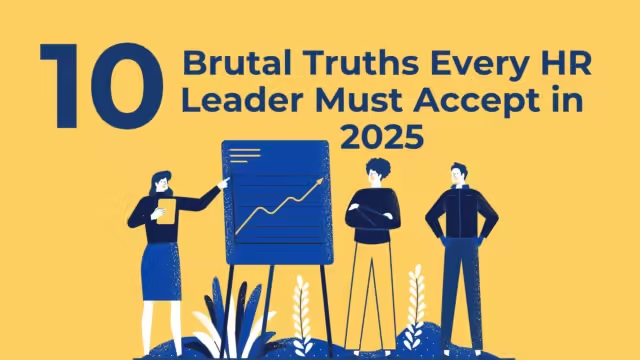The Unfiltered Reality of Leading People in a Post-Pandemic, AI-Powered India.
📰 EDITOR’S DESK | HROSTRUM.COM
The HR function in India has evolved from a support role to a strategic powerhouse. But 2025 isn’t about evolution anymore—it’s about revolution. With automation, AI, remote work, and Gen Z’s disruption, the traditional HR playbook is obsolete. Let’s uncover the uncomfortable truths HR leaders must accept to thrive in this new era of modern HR challenges in India.
1. 💼 Top Talent No Longer Cares About Your Brand—They Care About Their Brand
In 2025, your EVP means little if it doesn’t align with personal branding. Today’s professionals curate portfolios on LinkedIn, GitHub, and Instagram. If your job descriptions don’t resonate with their aspirations, you’re already irrelevant. This is one of the sharpest modern HR challenges in India: attracting value-aligned, brand-conscious talent.
“Your employer brand is not what you say it is. It’s what your ex-employees post about you on LinkedIn.”
2. 🧠 Upskilling is Not Your Initiative Anymore—It’s Your KPI
Indian companies love launching learning platforms. But 2025 demands ROI. Certifications without skills are useless. HR must quantify learning outcomes and tie them directly to performance.
3. 💸 Salary Transparency Will Hit India Faster Than You Think
AmbitionBox, Glassdoor, Reddit, and peer chats have opened the floodgates. If you’re not honest about compensation structures, you’re setting yourself up for employee distrust and high attrition.
“Pay secrecy is no longer protection—it’s a ticking bomb.”
4. 🤖 AI Won’t Replace HR—But HR Without AI Will Be Replaced
Manual attendance tracking? Gut-feel hiring? Outdated. Embrace predictive analytics, AI-led screening, and automation or be outpaced by tech-forward HR teams.
5. 👩💻 Hybrid is Here to Stay—But Leadership Mindsets Haven’t Caught Up
In India, many companies still judge productivity by physical presence. This must end. Flexibility isn’t a perk anymore—it’s a basic expectation.
6. 📉 Engagement Surveys Are Dead. Action Is the New Metric
Yearly engagement surveys are performative unless followed by action. Pulse checks, micro-feedback tools, and instant resolution systems define employee trust today.
7. 🚪 The Exit Interview is Too Late
By the time someone reaches an exit interview, it’s over. Focus on proactive culture sensing. Build systems that detect disengagement before it leads to attrition.
8. 🔥 Campus Hiring is Broken—And You Know It
Generic pitches. Boring PPTs. Lack of connection. Indian students want inspiration, not information. Offer simulation-based tasks, storytelling, and real impact conversations.
“If your campus PPT looks like 2015, expect your joinings to drop by 50%.”
9. 🧹 DEI Isn’t a Slide—It’s a Structural Rewrite
Tokenism is transparent. One woman on a panel isn’t inclusion. 2025 HR must embed diversity in hiring pipelines, leadership grooming, and policy frameworks.
10. 🧳️ Employees Are Not Assets—They Are Advocates (or Enemies)
Every employee is an influencer. A toxic work experience gets posted faster than an offer letter. Make sure your culture isn’t just branded well—it’s lived well.
💥 Final Word:
2025 isn’t about adapting—it’s about leading. Indian HR leaders must wake up to these brutal truths, take control of their narrative, and create cultures where both performance and people thrive. Facing the modern HR challenges in India is no longer optional—it’s your new mandate.
“Be the HR leader who sparks change, not the one who gets disrupted by it.”
For more such disruptive insights, follow us at HRostrum.com and join the #HRUnfiltered movement
#HR2025 #FutureOfWork #HRLeadership #HRTrendsIndia #PeopleStrategy #WorkplaceRevolution
Contribute to HRostrumHR
Would you like to share your insights on HR trends, corporate strategies, or the future of work? We invite HR professionals, business leaders, and industry experts to contribute to HROstrum!

Follow us on LinkedIn
Access similar article here










